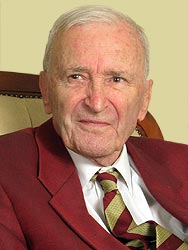Bari Cain: Today we have on the phone link Barry Groves from the UK talking
about the correct diet for Diabetes... Hello Barry, and welcome to the show!
Barry Groves: Hello again! [Barry gave a talk on Fluoride the previous week],
I'd just like to kick off the show with this quote about the prevalence of
diabetes, it's from the World Health Organization:
"There are 110 million diabetics currently in the world. By the year 2010
that number will reach 10% of the population, that's 600 million".
This is type II diabetes (i.e. dietary , occurs in later life). Type I affects
just 0.5 % of the population.
No essential carbohydrates….
You can live a healthy lifestyle without any plant carbohydrates whatsoever.
I recommend 50 grams of carbohydrate daily. For example, this is 2 cups of corn flakes.
Adverse effects of Sugar...
Excess sugar in the blood makes the blood sticky, which clogs the small
arteries and thereby harms eyes, heart; you get intermittent claudication
[pain upon walking which forces you to stand and "look in a shop window"
until the pain subsides]. Diabetes is a major cause of foot amputations, damages nerves, kidneys
Bari Cain: As a child I had one remote cousin who was a diabetic,
but now, I have many acquaintances who have diabetes.
Undiagnosed Diabetes...
Barry Groves: Yes! - And that does not include the undiagnosed cases! -
The onset of type II diabetes is at least 7 years before it is diagnosed
due to lavatory visits, angina , fatigue, slow healing and infections,
blurred vision and drowsiness. So most people don't know they have diabetes
for 7 years before it becomes obvious to be looked for and diagnosed by your
doctor [Editor's note: Another name for undiagnosed diabetes is "Insulin
Resistance Syndrome", which currently affects 40% of people at retirement age -
and this figure is worsening].
Diabetes is so easy to Cure!...
Bari Cain: A 7 year onset? Is there a cure?
Barry Groves: O Yes! This is so easy to cure! - You can cure Type II diabetes
within a day. Type I (injectable diabetes) is trickier. But if you are on
sulfonylurea [e.g. glipizide, but this applies to all tablet medications to
reduce blood sugar] all you have to do is cut down your sugar intake!
Bari Cain: Just cut down your sugar intake?
Barry Groves: Yes!
Bari Cain: So what are the foods we should eat in order to do that?
The Quoted "Risk" Factors are very misleading!
Barry Groves:
Really this is such a very simple disease... and when you asked me
to speak for half an hour, I wondered what I should talk about, but
I'll talk through the details first. The risk factors that are quoted are:
- Increasing age
- Physical Inactivity
- Increasing Obesity
- Longer duration obesity
- Apple shaped body fat distribution.
But these "risk factors" are actually very little to do with it
[in fact, quoting these "risk factors" does the general public great
disservice because it takes our attention from the actual cause of diabetes - editor]…
The standard Definition of Diabetes is a bad Definition...
Diabetes is defined as:
"a clinical syndrome characterized by chronic hyperglycemia
due to a deficit or diminished effectiveness of insulin".
But this is a bad definition because it ignores the dietary cause of
diabetes. The correct definition is:
"A clinical syndrome characterized by chronic hyperglycemia due
to an excessive intake of carbohydrate",
...because it is only carbohydrate that puts glucose into the blood.
There is only one dietary component that puts glucose in the blood and that is
carbohydrate. Proteins and fats don't. Very simple!
Bari Cain: So what are the foods we should eat in order to avoid eating
carbohydrates?
The Conventional Diet for Diabetes actually raises Insulin!...
Barry Groves: Right - the conventional diets for diabetes - is the same
as for everybody else - foods based upon starches and so on: the so called
"healthy low fat diet" of bread, pasta , breakfast cereals, veges. All these
things are the very things that raise insulin. And there seems
to be a good reason for this. Diabetics have a higher rate of heart disease
than the average population, and it seems like a good idea to tell diabetics to
"avoid animal fat". If you tell people to cut down on fat, and fat comes with
protein, then all you are left with to eat is carbohydrate. And this really is
where it has all gone wrong.
Obesity does not cause Diabetes!...
Most diabetics are overweight and have been told that obesity causes diabetes.
In fact it doesn't. Diabetes and obesity are both caused by the same thing.
The problem with this is with the sort diet they are given. Insulin diverts
blood glucose into fat and it also has a second job, it inhibits fat break down
from fat cells. Now, your high blood glucose leads to high insulin. Your
pancreas up regulates in response to increased demand and you get an exaggerated
insulin response to even small amounts of glucose This leads to insulin
resistance in fat and muscle cells and you end up with what is known as glucose
intolerance. One thing they don't do with conventional treatments is tell you to
stop eating the cause of the problem, which is carbohydrate.
Definition of Insanity...
Albert Einstein said that insanity is doing the same thing over and over again
and expecting a different result. I mean, if you get diabetes by eating
carbohydrates and only eating carbohydrates, giving diabetics more of them is insanity!
What we need is reduced demand on the beta cells and everything reverts back to
normal again. You can do this with the Groves diet test...
The Groves Diet Test...
Now... The Groves Diet Test. What we need to do is get blood glucose down.
It can be done so quickly: If you as a diabetic, have scrambled eggs in the
morning. This is how you do it: When you get up in the morning measure your blood
glucose, then have a breakfast of boiled or scrambled eggs in 20 grams of butter.
Measure glucose afterwards; you will find that you will not have a anything like
the glucose spike that you would have had with what you were told to have for breakfast
and what you probably are having. You are in fact "cured" - the only problem
is that you have to do it for life. And that is where the problem lies, because
not everyone wants to eat a more restricted diet.
[A list of books and websites is introduced at this stage. It is listed at the
bottom of this web page]
Bari Cain: Barry, could you give the short version on what you should
eat, and then go on to explain it in more detail?
The Groves Diet...
Barry Groves: OK! Short version then.
It must be made clear that animal fats are healthy. It is only the
polyunsaturated (margarine, vegetable oil and packaged foods) that are unhealthy.
We're eating milk, cream, butter, fresh fruit and greens of less starchy vegetables -
that's vegetables, but not too much fruit. Protein based upon animal origin
(organ meat too - kidney, heart and bone marrow), fish, eggs, cheese, not
cottage cheese, but rather full cream cheese. Milk, but not too much because
of the lactose content, which is a sugar. Our bodies need protein and energy
(vitamins and minerals too, but if we eat a mixed diet there is no problem with
that). We need one gram of protein per kg of body weight daily. Now there is
23% protein in meat, eggs and fish, so you can work that out. 100 grams contains 23 grams of protein.
You mustn't go high protein because although it doesn't raise glucose
levels, but it will raise the insulin response.
So we want 15 to 20% of calories from protein. Buy meat as fat as possible,
organ meats as well! Eggs: 3 or 4 (or a half dozen if you like), cheese, but
rather high fat cheese: cheddar, Swiss and Italian, Camembert, not cottage cheese.
Fish: Mackerel tuna sardine, get them in olive oil or brine, not in vegetable oil
because vegetable oil is harmful. Chicken with skin on, fry foods in animal fats
or coconut oil. Olive oil on salad. If this is going to work, you have to eat
60% of your calories as fat. If I can just go over the healthy ones and unhealthy ones again? -
Bari Cain: Great!
Healthy Fats
Barry Groves: Only eat fats, that's lard , dripping goose fat, butter, egg yolks, cream fish,
are healthy. So are coconut oil and olive oil. It's only the polyunsaturated
margarines and cooking oils that aren't healthy. And that brings me on to
carbohydrate. Let's get one thing clear...
There are no essential carbohydrates. You can live a perfectly healthy
life on no plant carbohydrates whatsoever.
We want to limit carbohydrate to no more than 10 to 15% of carbohydrate calories
spread over the day. This really means no more than 50 grams total carbohydrate
per day. (one cup of cornflakes is 22 grams). So beware of concentrated
carbohydrates such as sugar, honey, jam soy, potato bread and pasta. Also
starch or sugar drinks, and very sweet tropical fruits, low fat or 'lite'.
Eat broccoli , cabbage, onions, sprouts spinach, lettuce carrots and cucumber
with impunity, and restrict fruit to about 2 or 3 per day.
"Your diabetic councillors know all about this and should be
giving you different advice"...
One last thing to tell the listeners...
Just if what I have said goes against what diabetics have been told by
their diabetic clinic, let me just give you a quote:-
In general, study has demonstrated that multiple risk factors
for coronary heart disease are worsened for diabetics who consume the low-fat,
high-carbohydrate diet so often recommended to reduce these risks.
That is as quote from "Diabetic Care"(2), it's a medical journal, especially for
diabetic councillors, so your diabetic councillors know all about this and should
be giving you different advice.
Bari Cain: Thank you Barry. That was Barry Groves from the UK. He runs
an very informative website, which is located at www.second-opinions.co.uk . If
you are diabetic, please follow up on this and do your own research, and make
a fully informed decision for what you want to do to protect your health.
Here are a list of websites and books
[Follow up information recommended by Bari]
Websites
Books
- Sally Fallon Mary Enig: Eat Fat Loose fat
-
C B. Allan Wolfgang Lutz: Life Without Bread: How a Low-Carbohydrate Diet Can Save Your Life
- Tom Cowan: The fourfold path to healing.
References
- Much of the content of this interview is to be found at
"THE CHOLESTEROL MYTHS" Part 9: The Dangers of a "Healthy"
Diet by Barry Groves:
http://www.second-opinions.co.uk/cholesterol_myth_9.html
- (Chen YD et. al. Why do low-fat high-carbohydrate diets
accentuate postprandial lipemia in patients with NIDDM? Diabetes Care, 1995
Jan, 18:1, 10-6) [This and other scientific quotes that show up the currently
deplorable state of dietary advice for diabetics is to be found at
http://www.second-opinions.co.uk/cholesterol_myth_9.html]
Barry Groves Diet Interview (Transcription) ©by Bruce Thomson, EasyVigour Project
Return to Top
|
|
About Barry Groves...
Low Carb diet for 43 years...

At the time of this interview, Barry is 68 years of age, and has been on a low carb diet for 43
years...
"After marrying in 1957, Barry and his wife, Monica, became very overweight.
They tried low-calorie dieting, inert fillers, sweaty plastic clothes, exercise,
et cetera, with no long-term success. Then, in 1962, Barry discovered the low-carb diet..."
Barry with Archery Medals...
 /> />
Since his retirement from the Royal Air Force in 1982, Barry has taken up research and publishing into diet
and health related issues, and has enjoyed international success in his chosen sport of archery.
All that fatty food does not seem to have harmed him in the least!
Barry's Current Best Selling Book is:-
For reviews of the below book, please click here.
The Barry Groves website:-
www.second-opinions.co.uk
Book Recommendations...
(1) Life without Bread by C B. Allan and Wolfgang Lutz
Wolfgang Lutz, co-author of "Life without Bread" 84 years young...

At the time of this photo, Dr. Lutz was apparently
still practicing internal medicine in Salzburg.
Lutz was born in 1913, and was still going strong in the year 2,000.
In 1958 he came into contact with nutritional problems and to the conviction that
carbohydrates in the civilized diet play a special pathogenetic role.
For Reviews of the below book, please click here.
|
|